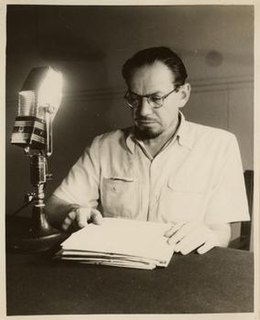A Quote by Ayn Rand
Man's basic vice, the source of all his evils, is the act of unfocusing his mind, the suspension of his consciousness, which is not blindness, but the refusal to see, not ignorance, but the refusal to know.
Related Quotes
Modern man lives isolated in his artificial environment, not because the artificial is evil as such, but because of his lack of comprehension of the forces which make it work- of the principles which relate his gadgets to the forces of nature, to the universal order. It is not central heating which makes his existence 'unnatural,' but his refusal to take an interest in the principles behind it. By being entirely dependent on science, yet closing his mind to it, he leads the life of an urban barbarian.
Socrates was the chief saint of the Stoics throughout their history ; his attitude at the time of his trial, his refusal to escape, his calmness in the face of death , and his contention that the perpetrator of injustice injures himself more than his victim, all fitted in perfectly with Stoic teaching. So did his indifference to heat and cold, his plainness in matters of food and dress, and his complete independence of all bodily comforts.
In my acquaintance with John Rawls, I found him to be a simple and honest man, who just by chance also happened to be the greatest moral philosopher of the twentieth century. I would like to think that I could emulate at least his modesty - his refusal to exaggerate his perception of himself and his place in the larger scheme of things - even if my work never compares with his in its importance.
Man's mind is his basic tool of survival. Life is given to him, survival is not. His body is given to him, its sustenance is not. His mind is given to him, its content is not. To remain alive, he must act, and before he can act he must know the nature and purpose of his action...To remain alive, he must think.
Man's mind is his basic tool of survival. Life is given to him, survival is not. His body is given to him, its sustenance is not. His mind is given to him, its content is not. To remain alive, he must act, and before he can act he must know the nature and purpose of his action. He cannot obtain his food without a knowledge of food and of the way to obtain it. He cannot dig a ditch-or build a cyclotron-without a knowledge of his aim and of the means to achieve it. To remain alive, he must think
The religious urge in man is not a mere passing phase in the history of his spiritual development, but the ultimate source of all his ethical thought and all his concepts of morality; not the outcome of primitive credulity which a more "enlightened" age could outgrow, but the only answer to a real, basic need of man at all times and in all environments. In another word, it is an instinct.
Very often pessimistic people speak against their own desire. They want to undertake some work, and they say, 'I will do this, but I don't think I shall succeed in it.' Thus they hinder themselves in their path. Man does not know that every thought makes an impression on the consciousness and on the rhythm with which the consciousness is working. According to that rhythm that reflection will come true and happen; and a man proves to be his own enemy by his ignorance of these things.





































